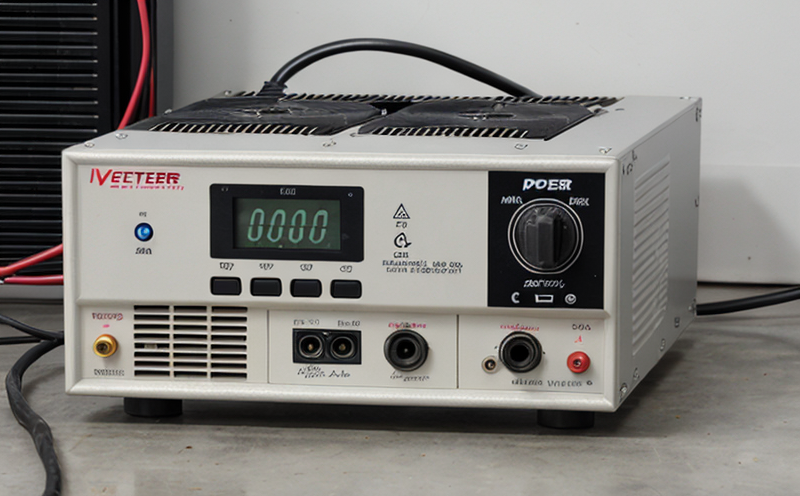IEC 62116 Anti-Islanding Protection Testing of Inverters
The International Electrotechnical Commission (IEC) standard IEC 62116:2013 is a critical specification for the testing and certification of anti-islanding protection in inverters. This standard aims to ensure that grid-tied photovoltaic systems are capable of safely disconnecting from the electrical grid during faults, thereby preventing potential hazards such as backfeeding into live circuits.
Anti-islanding refers to the phenomenon where an inverter continues to supply power even after the main utility grid has been disconnected. This can pose a significant risk to maintenance personnel and the integrity of the grid itself. IEC 62116 provides detailed procedures for testing inverters to verify their compliance with this protection mechanism.
The testing process involves simulating various fault conditions in the electrical network, including voltage dips, short circuits, and other disturbances that could lead to islanding. The inverter's response is then monitored and analyzed to ensure it disconnects from the grid within a specified time frame—typically between 50 milliseconds (ms) to 2 seconds after detecting an abnormal condition.
For accurate testing, specialized equipment such as power analyzers, voltage/current sources, and simulation software are used. The test setup must closely mimic real-world scenarios to provide reliable results. Post-testing analysis involves evaluating the time taken for the inverter to trip, its accuracy in identifying fault conditions, and its ability to safely disconnect from the grid.
Compliance with IEC 62116 ensures that inverters meet international safety standards, thereby facilitating market entry into countries where these specifications are mandatory. This is particularly important given the growing demand for renewable energy sources and the increasing adoption of solar power systems worldwide.
- International Acceptance: IEC 62116 has been widely accepted by many countries including the USA, Germany, China, and India. Compliance with this standard is a key requirement for import/export regulations in these markets.
The testing process requires meticulous attention to detail and robust equipment to ensure accurate results. Proper specimen preparation includes verifying that all components of the inverter are operational before beginning tests. Rigorous adherence to the IEC 62116 protocol ensures reliable performance data, which is crucial for regulatory compliance.
Understanding the intricacies of this standard requires expertise and experience. Our team at Eurolab brings together a wealth of knowledge and industry best practices to deliver accurate and reliable testing services. With our state-of-the-art facilities and experienced engineers, we can help you navigate the complexities of IEC 62116 compliance.
Eurolab Advantages
At Eurolab, we pride ourselves on providing unparalleled expertise and service for all your testing needs. Our team of highly skilled engineers is dedicated to ensuring that every inverter tested meets the highest standards set by IEC 62116.
- Accurate Testing: Our advanced equipment ensures precise results, leading to reliable compliance with international standards.
- Expertise: With years of experience in renewable energy testing, we bring a wealth of knowledge to each project.
- Rigorous Quality Control: We adhere strictly to the IEC 62116 protocol to ensure that all tests are conducted with utmost precision and accuracy.
- Compliance Assurance: Our services help you navigate regulatory requirements, ensuring smooth market entry into global markets.
We understand the importance of meeting international standards for safety and quality. With Eurolab, you can rest assured that your inverters will be tested to the highest standards, providing peace of mind and a competitive edge in the marketplace.
International Acceptance and Recognition
- Australia: Australian Standards AS/NZS 4730.1:2015 incorporates IEC 62116, making it mandatory for grid-tied inverters to comply with these anti-islanding protection requirements.
- Brazil: The Brazilian National Standard ABNT NBR 15498 includes references to IEC 62116, ensuring that local and imported inverters meet international safety standards.
- Japan: Japanese Standards JIS T 7903:2010 aligns with the principles of IEC 62116, emphasizing the importance of anti-islanding protection in renewable energy systems.
- South Korea: South Korean Standard KS A 8541 explicitly references IEC 62116 for grid-connected inverters, ensuring compliance with international best practices.
The widespread adoption of IEC 62116 across these and other countries underscores its significance in the global renewable energy sector. Compliance is not only a requirement but also a testament to your commitment to safety and quality.
Competitive Advantage and Market Impact
Compliance with IEC 62116 provides significant competitive advantages for manufacturers of grid-tied inverters. By demonstrating adherence to this international standard, you can:
- Earn the trust of consumers and regulatory bodies.
- Gain a foothold in lucrative global markets.
- Avoid costly penalties associated with non-compliance.
- Enhance brand reputation and market credibility.
In a rapidly evolving renewable energy landscape, meeting these standards is essential for long-term success. Eurolab’s testing services not only ensure compliance but also provide the insights needed to optimize your products for maximum performance and safety.





